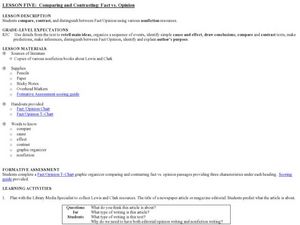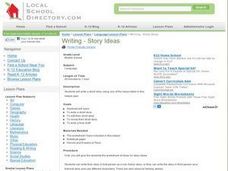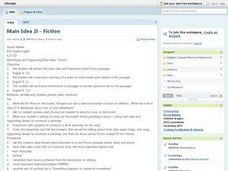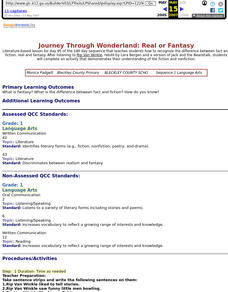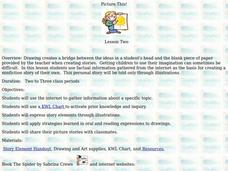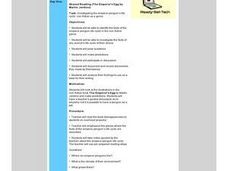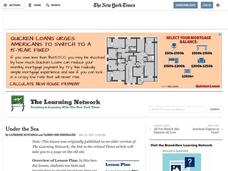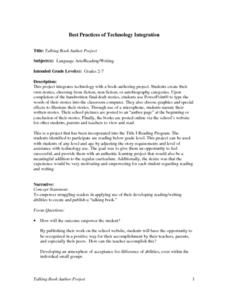Curated OER
The Adventures of Huckleberry Finn Packet
Readers of The Adventures of Huckleberry Finn are directed to complete two projects as a part of their study of Mark Twain’s novel. Individuals craft an organized notebook containing all their work during the study, and they research...
Curated OER
Comparing and Contrasting: Fact vs. Opinion
Elementary schoolers investigate nonfiction stories by analyzing facts and opinions. They read nonfiction stories about the Lewis and Clark expedition. Pupils utilize a T-chart to list the facts and opinions on opposite sides, and then...
Curated OER
What Makes the Writer Write
Your 11th and 12th graders are ready to critique society! Channel that inclination by studying a novel that offers social criticism of other eras (book recommendations included). This resource presents a well-thought-out overview of such...
Curated OER
Informational Writing-Creating a Speaker's Voice
Fifth graders study speaker's voice in informational writing. For this writing lesson, 5th graders discuss the difference between an interesting non-fiction excert and a reference non-fiction excerpt.
Curated OER
Writing - Story Ideas
Students write their story in first person as a non-fiction story, or they can write the story in third person as a fictional story and use different characters. They can choose an idea from one of the story starters provided.
Curated OER
Main Idea- Fiction
Eighth graders investigate the concept of main idea and supporting details, and how they are used in the genre of fiction. In this literacy lesson, 8th graders listen to a fictional passage and take notes on the characters, setting,...
Curated OER
Journey Through Wonderland: Real or Fantasy
First graders recognize the difference between fact and fiction, real and fantasy. After listening to Rip Van Winkle, retold by Lara Bergen and a version of Jack and the Beanstalk, 1st graders demonstrates their understanding of fiction...
Curated OER
Tall Tales: Read, Write, Draw and Sing
Students get to know the characters and events that shaped American folktales through writing, drawing and singing activities. Handouts and worksheets are included.
Curated OER
Hiragana - Perfect ~ Writing a Japanese Pictionary
Students listen to a story and view Japanese artifacts. They use the internet to explore the writings known as Hiragana. They create their own Japanese pictionaries and share them with the class.
Curated OER
Picture This
Students explore finding facts from the Internet to create a nonfiction story. In this writing activity, students fill out KWL charts and do internet research about the given topic of spiders. Students then create and illustrate their...
Curated OER
Sequencing
High schoolers consider how cause and effect translate into sequencing in literary works. In this sequencing lesson, students read non-fiction passages about Eleanor Roosevelt and Clara Barton. High schoolers complete graphic organizers...
Curated OER
The Rest Cure: Gender in Medicine and Literature
Read and discuss "The Yellow Wall-Paper" and the gender issues that the story brings up. Use articles from the time period to analyze, complete with specific discussion questions. After two days, scholars write an essay based on topics...
Crafting Freedom
Sequencing of Events in the Slave Narrative of Henry "Box" Brown
What steps did Henry "Box" Brown take while planning his own escape from slavery? Learners work in groups to analyze segments of Brown's narrative and identify the sequence of the most important events of his story.
Dawgeared.com
Book Review
Reflect on your reading with a book review form. After finishing a novel or short story, kids choose the correct genre and discuss their favorite part. They also decide which part they would change, and whether or not they would...
Curated OER
The Emperor's Egg by Martin Jenkins
Students explore the penguin life cycle. For this penguin life cycle lesson, students read the book The Emperor's Egg by Martin Jenkins. Students look at the pictures and make predictions. Students identify facts about penguins and do...
Curated OER
Lesson 1: Identifying Information in Nonfiction
If you are in need of a lesson on identifying information in a non-fiction text, look no further. The class learns how to use a KWL chart to identify explicit information in the book, Frogs by Gail Gibbons. They fill out the KWL chart,...
Curated OER
Recreation Book- Book Report
In this literature worksheet, student read a non-fiction book about a recreational activity that includes the rules and regulations. They write a dictionary of terms, teach others how to play, make a "play safe" poster, videotape the...
Curated OER
Biography: Telling Someone's Life Story
There are many different ways to help your students get excited about writing biographies.
Curated OER
Under the Sea
Students imagine and describe fictitious sea animals that might live in the ocean. After reading an article, they reflect on new discoveries found in the ocean recently. Using the internet, they research the interdependence of animals...
Syracuse City School District
Literary Elements
Address the literary elements in a piece of writing using these materials. The packet includes plenty of resources, and focuses mainly on theme, character, and point of view, with some materials for setting, symbolism, and author's...
Curated OER
Different Genres In Literature
Third graders view different genres of literature and identify which genre is being presented to them. In this genres lesson plan, 3rd graders choose from fiction, non fiction, and a poem.
Curated OER
Figurative Language
What is figurative language, and why do we use it? Introduce your high schoolers to some examples and discuss the importance of including this element in your writing. After studying a text and searching for examples, writers will...
Curated OER
Talking Book Author Project
Students explore fiction, non-fiction, and autobiographies. They create their own stories using one of the categories. Students create a PowerPoint presentation to tell their story.
PBS
Reading Adventure Pack: Folktales
Following a reading and thorough discussion of books—Anansi the Spider: A Tale from the Ashanti by Gerald McDermott and The Moon Book by Gail Gibbons—scholars complete three activities. First, they use playdough or cookie dough to create...
Other popular searches
- Non Fiction Writing
- Ks1 Non Fiction Writing
- Non Fiction Writing
- Non Fiction Writing Memoirs
- Non Fiction Writing Prompts
- Non Fiction Writing 2 Grade
- Non Fiction Writing Lesson
- Non Fiction Writing Frames
- Non Fiction Writing Prompts
- Creative Non Fiction Writing
- Non Fiction Writing Format
- Non Fiction Writing Process



